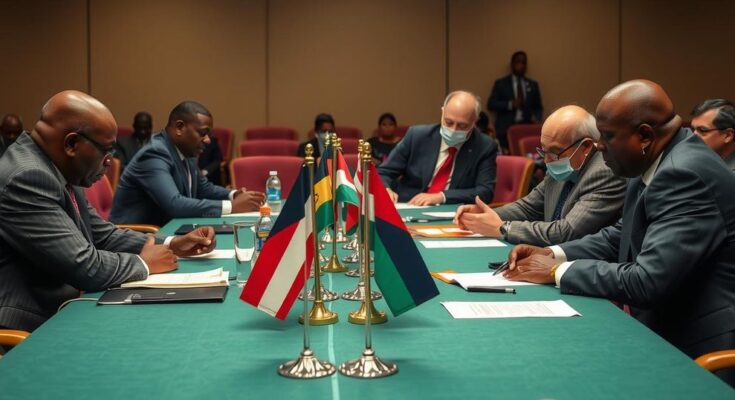South Sudan peace talks resumed in Kenya after a four-month hiatus due to the sacking of a government delegation. The negotiations, involving opposition groups excluded from the 2018 peace agreement, aim to address ongoing conflicts and integrate holdout group concerns. Political and economic challenges persist as the nation faces delayed elections and human rights issues.
South Sudan’s peace talks, which had been stalled for four months, resumed on Wednesday in Kenya following the dismissal of the previous government delegation. This round of discussions is focused on seeking an end to the ongoing conflict that has severely impacted the nation’s economy. The ongoing negotiations involve the South Sudanese government and several opposition groups previously excluded from the 2018 peace agreement, which had ended a brutal civil war resulting in over 400,000 fatalities.
Named ‘Tumaini’—meaning hope in Swahili—these peace talks commenced in May and included a commitment declaration towards achieving lasting peace. However, progress stalled after President Salva Kiir removed the initial delegation, leading to a new team that faced travel complications to Nairobi on two occasions. President Kiir clarified that these talks aim to integrate concerns from holdout factions and are not intended to replace the prior agreement from 2018.
Meanwhile, the full implementation of the 2018 peace agreement remains pending, with elections originally scheduled for December 2024 now postponed until 2026. The delays stem from insufficient voter registration funding, exacerbated by an economic crisis, which has left civil servants without salaries for over a year. Moreover, disruptions to oil exports from South Sudan caused by a damaged pipeline in Sudan are further complicating the financial situation.
During the talks, both sides voiced concerns regarding a new law permitting detentions without warrants, viewing this as a breach of human rights. Chief mediator Lazarus Sumbeiyo called on all parties to finalize discussions on outstanding issues, emphasizing the crucial nature of these negotiations. Pagan Amum, leader of the South Sudan Opposition Movement Alliance, urged the government team to adhere to previously established agreements, stating, “This is not a time to renegotiate what we have already agreed upon.”
On the government side, Kuol Manyang Juuk encouraged collaboration, stating, “We are not here to start the talks from scratch; we are here to build on what has been accomplished.” In conclusion, these resumed peace talks are pivotal for South Sudan as its leaders strive to prevent further disintegration of the nation and restore stability.
The peace talks in South Sudan are a significant development in a nation that has faced prolonged conflict following its independence in 2011. The previous civil war, which lasted five years, resulted in catastrophic human and economic losses. While the 2018 peace agreement saw an end to this conflict, its implementation has been fraught with challenges, leading to continued unrest and delays in governance processes such as elections. The ongoing talks aim to address outstanding issues with factions that did not participate in the original agreement, highlighting the complexities of establishing lasting peace in the region.
The resumption of peace talks in South Sudan is a critical moment in the quest for stability and recovery in the nation. With a new government delegation attempting to navigate ongoing tensions and humanitarian concerns, the outcomes of these discussions could significantly influence the country’s future. Both parties are encouraged to build on previously agreed terms to avert further chaos and facilitate a path towards peace and prosperity.
Original Source: apnews.com




